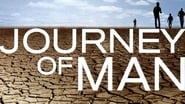worleythom
We're shown five fairly isolated groups of people, who, we're told, have genetic markers indicating humankind's migration around the globe.(72,000 years ago, global droughts and freezing began. This would've been about the time of the Tova volcano eruption. There is little evidence of human habitation anywhere from about 60,000 to about 30,000 years ago: partly due to probable very low human population; partly because much of the area humans were in at the time is now under water, as the sea level rose.)1. Bushmen of southwest Africa. The language of these people has many more sounds than languages anywhere else in the world. Linguists speculate this is the ancestral language: all people started as southwest African Bushmen: as they left, they progressively forgot many of the original sounds. Only the remaining Bushmen still have the largest tonal alphabet. Geneticist says everyone on Earth descends from people living in Africa as recently as 50,000 years ago.(African drought would've driven herds of prey animals out to Asian grasslands: people would've followed.)2. Australian aborigines. Evidence of human population as early as 45,000 years ago. At the time, ice caps were so thick, sea level was as much as 400 feet lower. No evidence of human migration from Africa to Australia: the path is now under water. However, genetic markers Aborigines have also occur in India: evidence the Aborigines came that way.3. Central Asia. This is apparently the destination of the second out-of-Africa wave, after the Australian migration. From central Asia, some people then traveled West to populate Europe, painting the cave drawings in southern France. Others traveled east.4. Siberia: reindeer herders in northeast Russia, where it's very cold. Nice video of the very small group of people here, herding their reindeer and moving their portable houses, in winter. People from here would've gone across the land bridge to the Americas.5. Navajo territory in northern New Mexico by 15,000 years ago. (This video is from 2002. Since then, evidence of earlier human presence in the Americas has been found.)This sort of genetic mapping can be done only while (1) the technology exists, which is only very recently, yet (2) there are still pockets of people who have maintained their closed group for time out of mind, without in-migration of foreigners. Once everyone is all mixed together, there will no longer be any evidence of who came from where.At 2 hours, the video is much longer than the interesting bits warrant. Much of the time focuses on the presenter traveling.Presenter makes inaccurate statements like, "the Bushmen are the oldest people in the world." No, everyone in the world, all of us, descend from the same original people. The lineage of each and every one of us is identically ancient. What's unique about the Bushmen is, they live in the place, and perhaps in the way, we're presumed to come from.Likewise, the presenter makes a big fuss over a particular man in central Asia who, he says, is a direct descendant of the first man who had a genetic marker that spread from there to Europe and the Americas. Well, *everyone* of European or Native American stock is likewise a direct descendant of that same man. The man the video focuses on merely happens to live in about the place that ancestor of Europeans and Americans is thought to come from--and who happened to have his blood sampled.Presenter seems to overemphasize his own importance. Clearly, a great deal of DNA sampling was done of isolated groups of people all over the world, to base the hypotheses on. Most of it was presumably done by other researchers.
videoeditor1234
I watched this in my anthropology class, and Spencer Wells is, to be quite honest, a pompous ass. Yes, he is a brilliant geneticist, but he is also very culturally insensitive. He goes and interviews many peoples, and basically tells them that their religious beliefs of where they came from were wrong. He took a wrong approach to the whole thing, and was actually shot down several times by people he was interviewing. Yes, he is smart, and i do agree with his research as being very helpful, but he also places himself much higher than others. He really should have taken along a cultural anthropologist with him... Other than that, the movie was very good, and he did a great job of explaining his theories, and as to why they were true. But, he did whine a bit to much when he went out to meet the reindeer herders.
OnlyRocknRoll
One of the best anthropological documentaries that I have ever seen. Hopefully, it will make a dent in the plague of racism.It's amazing how resistant contemporary humans are to the knowledge that no matter how different they think they look from each other, they are in fact ALL RELATED. Ideology is, indeed, still the last part of a culture to change.I don't really have any criticism, but I wish Dr. Wells had included the relationship between the various Oceanic groups to Australia, New Zealand, and South Asia.The book is a bit tougher going unless you're an academic. But the video is suitable for everyone.
Ted Precht
Shows the path taken by human migrations out of Africa, by locating and following markers in the DNA. The narrator is an American scientist, Spencer Wells, and a very adept commentator and explainer. His film crew travels to many world sites, starting with a group of "bushmen" in Africa, which are the oldest bloodlines yet found - the origins of all the rest of us.He shows how the several migrations led to colonization of Australia, eastern Asia, and how those Asians led to the crossing of the Bering Straits and the eventual splitting into all the "native American" tribes. Other Asians (the oldest is in Kazakhstan) led to the population of Europe. All this in 2000 generations - since 40,000 years ago.Amazing stuff.


